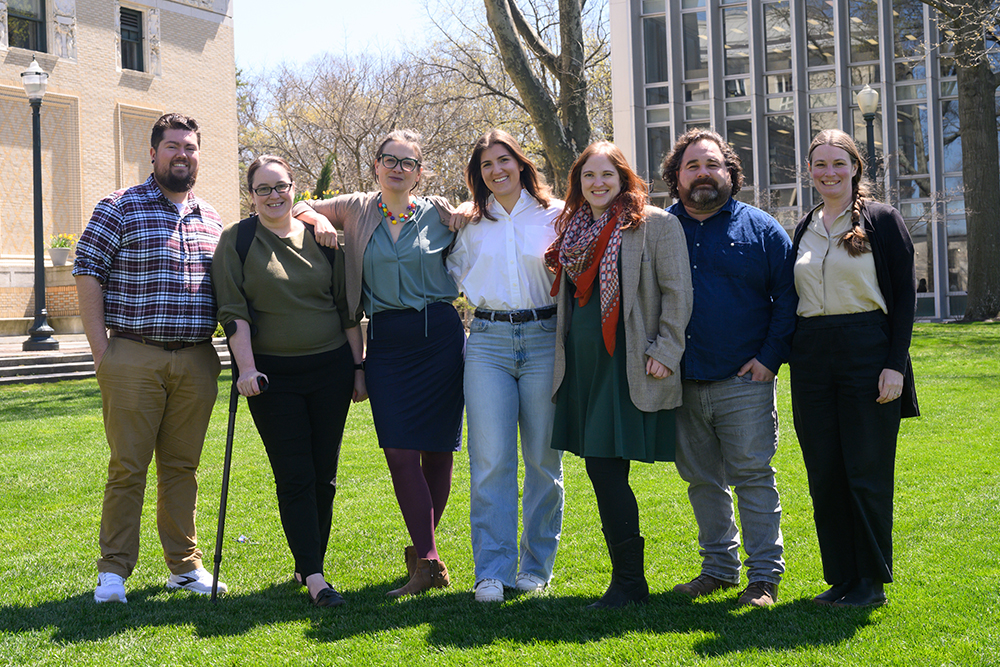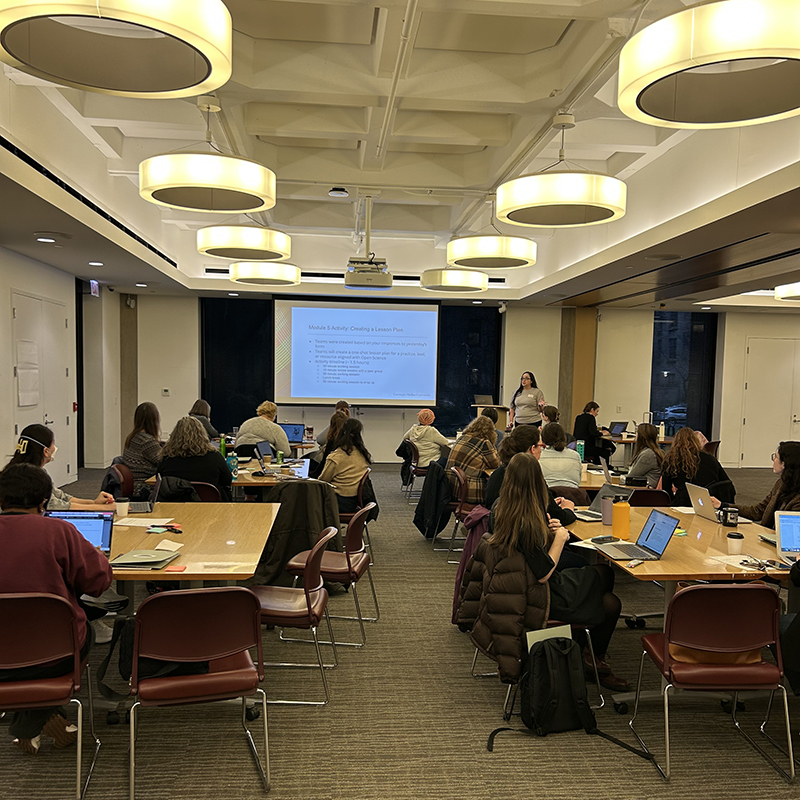
The Open at CMU team at Carnegie Mellon University Libraries supports researchers in making their work more transparent, accessible, and reproducible by providing expertise in open science, open data, open access publishing, and open-source software.
Since launching one of the nation’s first open science programs in an academic library, Carnegie Mellon University Libraries has emerged as a national model for how libraries can lead in transparent, inclusive, and collaborative research. This fall, the Libraries will expand that leadership through a dynamic slate of training opportunities, community-building events, and published resources designed to equip researchers and librarians alike to work in the open.
“We’ve spent the past several years building and refining our open science services. Now, we are excited to share our lessons learned and serve as a convener for conversations on how to support and practice open research for our CMU community and the broader librarian and researcher communities,” said STEM Librarian and Open Science Program Director Melanie Gainey.
Training Opportunities
Over the last eight months, Open Knowledge Librarian Emily Bongiovanni has led initial sessions of a training program created to engage participants in techniques for supporting, teaching, and advocating for various aspects of open science. Launched in the fall of 2023 with a $241,147 grant from the Institute of Museums and Library Services (IMLS), the IMLS Open Science Primer welcomed academic librarians for two days of instruction, discussion, and implementation.
 Referred to as a “train-the-trainer” program, the Open Science Primer equips librarians with the skills and resources needed to support open science within their own communities, all while taking into account different institutional needs and contexts. The first sessions took place around the United States, with CMU librarians traveling to Florida, Colorado, and Chicago to deliver sessions. Their carefully-crafted curriculum covered core principles and practices of open science, supporting open science across disciplines and the research lifecycle, current issues facing the field, and more.
Referred to as a “train-the-trainer” program, the Open Science Primer equips librarians with the skills and resources needed to support open science within their own communities, all while taking into account different institutional needs and contexts. The first sessions took place around the United States, with CMU librarians traveling to Florida, Colorado, and Chicago to deliver sessions. Their carefully-crafted curriculum covered core principles and practices of open science, supporting open science across disciplines and the research lifecycle, current issues facing the field, and more.
Participants left their sessions with new opportunities to support open science practices, and a foundation for participation in a community of practice.
“I attended the Open Science Primer so that I could improve my understanding of and ability to communicate the importance of Open Science to my campus community,” said Alexa Hight, Assistant Director for Research and Data Services at Texas State University, who attended the session at Colorado School of Mines. “I learned so much from the training, not only from the facilitators and materials, but from discussions with other attendees as well. I have already been able to discuss my takeaways within my library with librarians and staff and have created a libguide based on topics discussed in the training. I hope to continue implementing what I learned through workshops in the upcoming academic year.”
The Libraries will hold another in-person session at CMU’s campus in Pittsburgh in October. Registration for the in-person session this fall is full, but those interested can join the waitlist. The Libraries is also exploring alternative funding opportunities to be able to continue this work.
For librarians who would benefit from asynchronous access to resources, CMU librarians also contributed several chapters to the new Open Science Cookbook, recently published by the Association of College and Research Libraries (ACRL). Edited by Bongiovanni and Gainey, along with STEM Librarian Chasz Griego and former Open Science Program Coordinator Lencia McKee, the Open Science Cookbook is filled with step-by-step accessible “recipes” designed to guide librarians as they develop their own open science programming.
The cookbook dives right in with a recipe by Gainey, McKee, Bongiovanni, and Social Sciences Librarian Sarah Young, which covers how to package existing services as a program and identify assessments that measure program impact. Gainey and Young contributed to a second chapter as well, sharing another recipe titled “Infusing Open Science Ingredients into Evidence Synthesis to Create a Rich Medley for Researcher Support.”
Griego authored a recipe focused on creating lessons and prioritizing resources that make research more transparent and reproducible. Arts and Humanities Librarian Ashley Werlinich and Business and Entrepreneurship Librarian Jennifer McKee used their experience teaching a variety of Arts x Entrepreneurship workshops to share lessons about copyright, fair use, and remixing sources within an arts entrepreneurship context. CMU-Q Library Director Tatiana Usova and Instruction and Outreach Librarian Reya Saliba also contributed, offering thoughts on promoting open access to undergraduate researchers.
“For both of these initiatives, we looked at ‘science’ in the German sense — ‘wissenschaft,’ meaning ‘knowledge,’” said Bongiovanni. “Both the Cookbook and the Primer intentionally explore all aspects of open knowledge taxonomy, including open access publishing, open education, open data, and open evaluation. This is a great way to help librarians see how they’re already actively supporting and engaging with open science in many ways, and the additional approaches that are available to them as they expand their programs.”
Events
But the Libraries isn’t just spreading open science training across the country to librarians. The Open at CMU team is also committed to bringing key stakeholders together to discuss rapidly evolving opportunities and barriers for participating in open science. Several key events in fall 2025 will facilitate conversations between both librarians and researchers, ensuring that open science ideas are implemented in ways that are practical and grounded in the realities of day-to-day research.
First, on October 16, the Libraries will host the inaugural Cracking Open Unconference. This in-person event held in Pittsburgh will bring together members of the library and research communities for timely discussion on the challenges of practicing and supporting open science and potential solutions. The unconference offers a full day of in-person, participant-driven conversations, and is free and open to library professionals, academic researchers and support staff, and graduate students at any institution. Those interested in attending can fill out the brief application form.
Next, an in-person meeting of Open Science Collaborative of Library and Information Professionals (OSCLIP) will take place on October 17. Founded by STEM Librarian Huajin Wang, OSCLIP fosters a national network of library professionals committed to advancing open science through shared resources, peer support, and cross-institutional collaboration.
The group aims to amplify the impact of researchers while providing mutual support and resources to strengthen their role as essential components of the open science ecosystem, and will use the meeting to discuss actions the community can take together to support their shared goals. Registration for the meeting will be open soon; stay up-to-date in the meantime by joining the OSCLIP Google Group.
Finally, the Libraries’ signature open science event, the Open Science Symposium, will be held virtually on November 13. For the fifth year, the conference will offer a full day of virtual talks and panels from researchers and thought leaders in academia, industry, and publishing. It will explore how open science is transforming the ways in which academics do research and share it across STEM, social science, and humanities disciplines.
Confirmed speakers include Steve Diggs, Research Data Specialist and Senior Product Manager at California Digital Library, Lynda Kellam, Snyder-Granader Director of Research Data & Digital Scholarship at Penn Libraries and founding member of the Data Rescue Project, and Katie Steen-James, Senior U.S. Policy Manager with Open Source Initiative. Helen and Henry Posner, Jr. Dean of the University Libraries Keith Webster will speak at the conference as well.
The event is free and open to students, researchers, library, industry, and government professionals, and open science advocates everywhere. Registration is required to attend.
“By sharing our expertise and building inclusive communities of practice, we’re committed to making open science more achievable — and impactful — for researchers everywhere,” Webster said. “These initiatives reflect the Libraries’ role not just as a service provider, but as a convener and catalyst, sparking bold ideas and modeling what open research looks like at a world-class university.”
